- Home
- Ian Wallace
Z-Sting Page 16
Z-Sting Read online
Page 16
“You know that there’s a COMCORD countdown?”
Her unrouged lips went pale. Deliberately laying down her knife and fork, she drank the saki.
She then said tersely: “Pay the check. As to my apartment, it is not bugged. As to this place, who knows?”
“There is a countdown, as I was saying,” he resumed in her apartment over brandy. “I get the sense that you know about it.”
Her forehead was puckered. “Yes. And I get the sense that our mood is not going to be right for what I thought perhaps we both had in mind.”
“I can switch moods in a twice.”
“Good for you. It takes me a whole trice. So you switch when ready, Vishnu.”
“The name is Croyd.”
“I thought it was Hertz, Vishnu.”
“It is Croyd, really.”
“Really?”
“Really enough.”
“First name?”
“If my parents ever thought of one, they didn’t let me in on it. Just call me Croyd—in a languidly intimate tone of voice.”
“All right, Croyd. The countdown. I know how countdowns are theoretically supposed to happen, and that theoretically they cannot happen, and that actually one is happening—against Senevendia. Now you know all that I know. Go on from there.”
‘You make it easy, Midge. It seems I can talk pro.”
“Well—yes. And I promise to ask questions if you shake me off at a corner.”
“All right. There is a Countdown. And some very big shots in Mare Stellarum are trying to stop it. But they aren’t going to succeed. And I have an uncomfortable feeling that somehow it is going to confer permanent noctambulism on the whole planet.”
Long silence. Then a slug of brandy, with an audible swallow. Long silence again. Then: “I don’t know how you know, but you sound authentic. It leaves me with two recourses: total thanatoptic piety, or a whirl of last-minute hedonism. Another brandy may help me to decide—with you grinning at me, there.” She went to her bar for the bottle.
He said soberly: “I am not grinning, here.”
With her back to him—she was jacketless, open-neck-shirted, un-necktied—she murmured, “I know that.” She hesitated. She came to him with the bottle. He held out his glass; half his tot was still in it. She merely restored his tot. Then into her own inhaler she poured a tot and a half. Meditatively she corked the bottle and set it down beside her. She seated herself across from him. Chin in fingers, lower lip out a little, she mused: “There must be at least another day, so we shouldn’t increase the per-hour brandy intake. But we should give some thought to avoidance of interruptions.”
“I would be with you,” he told her, “if I thought it was hopeless.”
It jerked up her chin. “But you said—”
“—That Mare Stellarum will goof it.”
“Then what’s left?”
He frowned into his brandy. “I hate to sound egotistical, but—I’m the hope.” He looked up at her: “And you are.”
She stared at him. She arose, picked up the inhaler in one hand and the bottle in the other, walked to the bar, set them there, returned, sat, and stated: “I now intend to be sober. Mood switch, yes; liquor, no. But don’t let me poop your party—you know your own chemistry.”
Having nosed the brandy, he sipped, savored, set it down, and told her: “On the Moon ferry, you saw some of what I can do. I have only a ghostly plan, and my powers are not unlimited; but I intend to materialize the plan very fast. For this I need a Mare Stellarum officer. That’s you.”
“I am surprised that a man capable of projective hypnosis needs anybody.”
“As yet I can use it only against people who are totally off guard against it—like gatemen and commanders relaxed on Moon ferries, and somebody else who can use it but is all concentrated on using it against me. But in this final phase I will be moving in against people on guard, and I can’t trust it—I’ll have to depend on normal human-type deviousness.”
“Okay, then. So why me?”
“I looked you up for four reasons. The second reason is, you got me to Erth. Third, I want you to get me to Senevendia. Fourth, I want you to buy Senevendian shares like mad, using the name Ford.”
Having digested that, she leaned back in her chair, gripping the arms. “I must be transiently in love with you.”
“Why?”
“What you are saying makes sense.”
“Are you putting me on—or does it really make sense?”
She looked at him soberly. “It makes sense. Where do I get the money—or the credit?”
Unzipping the earlier-checked pocket, he produced a sheaf of currency and handed it to her. “Not all at once,” he warned, “and not all at one exchange. Take a full morning over it.”
Slowly she counted the bills. Halfway through she stopped and inquired: “Are all these bills this big?”
“Same denomination throughout.”
“Source?”
“Galactic, Limited. Not your Mare Stellarum.”
She leaned back, closing her eyes, slapping the wad against her palm.
“I know,” he acknowledged gravely. “It’s your decision. But I want you to know while you make it that the two very biggest people in Mare Stellarum know about me.”
“And are they for you?”
“The Chairman is. I think.”
Her eyes opened halfway. “I infer that Ziska isn’t. Which makes you my man. When do you have to leave me to do your part of it?”
“I can start operating this morning if I can get to Senevendia on the 0710 VIP tube.”
“I can get you on the tube if you can get me to my office by 0530.”
“Check.”
“When it’s all over, will you backcheck with me?”
“White stallions couldn’t stop me—if we’re both still around.”
Swiftly the money went inside her shirt. She arose: “You need a refill. Same?”
“Thinner, I think.”
“Zac collins?”
“Perfect.”
Taking his inhaler, she went to the bar, got another glass, and went to work on it with her back to him. Presently she remarked: “I need a lot of coaching on how to buy Senevendia intelligently.”
“No time like now.”
She brought him his drink, handed it to him, stood studying him a bit. “Croyd—”
“Midge?”
“This coaching—will it require vision?”
“Probably not.”
“Good, because my eyes hurt. Do you mind if I turn off the lights?”
“Pray do.”
Darkness.
“Croyd—”
“Why, Midge! you’re right here!"
“I know. Croyd—”
“Midge?”
“Do you need sleep to be sharp tomorrow?”
“Probably I’ll be sharper sleepless.”
“Me too. This coaching—will it require time?”
“If you’ll accept my projective hypnosis, I can set up your brain for it in two minutes.”
“Good. When I last looked, it was just past two. So we have maybe three hours.”
“Right.”
“Does it matter where among those three hours we position those two minutes?”
“Not really. Why?”
“I’m worried, a little.”
“What about?”
“About our money.”
“Go on.”
“It—isn’t in a very safe place.”
Long pause, Then: “Twice.”
Longer pause. Then, in a small voice: “Trice.”
In the Erthworld Union Tower, at 0530 hours on 23 May, Midge Carlton got on phones and began the complex process of getting Croyd a ticket on the early morning VIP tube to Senevendia. He watched her with a blend of admirations.
At one point she looked up and demanded officiously: “What is your emergency. Lieutenant Vishnu?”
He explained: “I have an old mother in Senevendia.”
She punched it into the board. Thirteen minutes later the pass came out, verkotype.
It was 0610. She took his arm and led him out to the vehicle platform, and she drove him to the tube terminal in her privately assigned official scouter-skimmer, a beat up 2465 model. (“I’ll get a three-year-old when I make l.c. next year, but it’ll still be a Chevvy.”)
Underground there was an all-night restaurant. They sat in a booth, gazing at each other across the table, mutually total.
0632. Somehow they awoke and arose. A waitress objected: “You never ordered!” Croyd passed her a credit: “You never noticed.”
There was a kissing-off room: it had a hundred booths, few occupied at that hour. “Let’s use the open room,” she suggested, “unless—”
‘The open room is fine,” he judged; “physiologically I am fifty-five.”
She corrected: “Thirty-five.”
“Nevertheless—”
“Well, yes. The open room.”
They kissed. Conventionally. Gradually they both realized that it was tender.
She drew her lips a millimeter away from his to ask: “Do you think we’ll ever see each other again?”
“Making sure that I can see you again is a large part of my incentive.”
“You aren’t serious?”
“I am serious about that.”
She laid fingers on his lips. “I wasn’t pushing you, our roads are different, but I just wanted to be sure about something—and I am sure. Please come back. I won’t wait for you—but I would instantly ditch anybody if the case weren’t serious.”
Four chimes gave him one-minute notice.
“Midge—do you understand love that is less than a long-term contract but a very great deal more than arousal?”
“I may not understand it. But I feel it. And I think that within the next month or two I’d better absorb it into my apperceptive mass and consciously forget it. Nevertheless—within the next month or two—try to come back.”
She kissed the backs of both his hands.
He kissed the backs of both her hands.
They stood apart, holding hands.
He demanded: “You understand your assignment?”
“Buy Senevendia.”
The chime sounded eight notes for thirty seconds.
They squeezed four hands.
He was gone.
She stayed a little while motionless in the open room.
She wandered toward the updraft, telling herself: “Carlton, to let yourself become serious is to militate against your long-range interests.”
At 0631 hours on the morning of 23 May, Pete Mulcahy knocked on Commander Marana’s door. No answer. The exec knocked again. Nothing. He touched the doorplate: the door disappeared.
Marana sat in his easy chair, dressed, drunk.
Mulcahy entered, closed the door behind him, went to Marana, slapped him about the jowls. Marana’s head nodded up. The exec unlimbered two restorative tablets from a shirt pocket and thrust them into Marana’s mouth. Lethargically the commander chewed.
“Swallow!” Pete commanded.
Dana swallowed and choked. Pete got a cup of water fast and pumped it in. Choking eased.
Pete waited.
Commander Marana looked up, all alert. “Pete, where are we?”
“Over Moskov. Doing the scansion.”
“Are you fully competent to complete it without my help?”
“Yessir.” Pete’s brows were up.
Dana was on his feet. “Take command. Unlimber my scouter. Keep in touch.”
Pete’s brows were down. “I have the usual questions—”
“Denied. Take command. Unlimber.”
“Yessir,” Pete assured the departing back.
At 0810, Mulcahy took a call from Croyd. “Mulcahy, why can’t I get through to Marana?”
Guarded: “Maybe he’s in the head. A message, sir?”
“Tell him I’m now Lieutenant Vishnu, and I’m in Senevendia, and I need him in the scouter just outside the palace, quicktime. He should air-anchor and activate invisibility and watch for my signal.”
Suddenly open: “Sir, Dana must have known, he took off with the scouter about 0700.”
Croyd’s eyes slitted in the visiphone. “Then what made you say he was in the head?”
“The scouter has one. It’s possible.”
“If he backchecks, Mulcahy, relay the message. This is deadly urgent. Out.”
Rehab Action Eight
CRITICAL IMBALANCE
Senevendia City, 23 May
Disembarking at the Senevendian tube terminal at 0800 on 23 May, Croyd-Vishnu came up to ground level and was immediately challenged by uniformed and turbaned sentries who demanded to see his orders. He showed them. At the experimental station on Moon, the Mare Stellarum inspector had fussily cut them to read: “Lt Patrick Vishnu 239640712631297 w/prcd as ncry to obtn indctd mtrls Rb prjct.” They passed him—who knows what their interpretation was?
As a Rab officer he made his call to the Mazurka, got Mulcahy, was surprised and disturbed, disconnected, proceeded.
He had left his grip at Carlton’s, and he saw no need to check in at a transient officers’ hotel. Challenging a skimmer, he got himself conveyed to the Chancellor’s Palace. Just outside the palace grounds, the skimmer said: “Sorry, guvner—the word his hout to go no closer.” He paid it off, and disembarked, and studied the shining white alabaster palace, peering between shining black carmorumbian fence pickets.
This palace, he reminded himself, was the Z-wave target. Not that Ground Zero mean anything special to the Z-sting (wherever it might be) which was programmed to curse the whole constellation; nevertheless, being on the spot was symbolically chilling. This palace was also the feeder of grievances and the commander of grievances and the submitter of such redresses as might be made. Consequently the key was here. But how did one get in?
The time was 0831. Unless Carlton should gain him some time buying Senevendia, the Penultimate Trigger might be tripped this morning, might indeed already be tripped; whereafter a Z-strike a bit over eight hours later was inevitable. So maybe he had minimum time to enter the palace, find Andhra, get his lead whatever it might be, and act on it however he might act . . .
Damn Ziska! They might have been working together on this!
How to penetrate the palace promptly? Projective hypnosis? too dubious. Uptiming? If he could do it again now, he mustn’t waste it on preliminary approaches . . .
Going to the main gate, he inquired about palace tours.
“First one at 0900, Lieutenant.”
“You mean—even now there are palace tours?”
Puzzlement: “Why not, Lieutenant sahib?” Croyd muttered something lame about the recent death of Erthworld Senator Mfssk; and he wandered across the grass-green skimmeravenue, entering a drugstore to kill a quarter-hour and think.
People drinking coffee, people eating ice cream for breakfast, people buying skimmer parts and nuclear lawnmowers, people gossiping nude in the public bath— ordinary drugstore activity. By now, everybody must have heard about the countdown—but evidently, nobody took it seriously.
At 0855, he quit the drugstore and returned to the palace gate. The queue was normally long, but there was a short preferential queue for visiting military, and he got into that. When the gate opened, his line moved first, passing through a reonic frisk (some visitors were shunted off for weapons check) and proceeding on foot across a half-mile of exquisite lawn toward the gleaming alabaster palace that was modeled ornately after the prehistoric masterpiece at Angkor Wat.
Entering the East Wing, the visitors were broken into groups of twenty-five per guide (mixed fifteen military to ten civilians until the military queue would be exhausted). A happy-type girl guide welcomed Croyd’s group to the palace in the name of Chancellor Andhra, gave them a swift overview of the forthcoming two-hour tour, and launched immediately into a description of the marvels of Vendic and Oathayan and African and
Western architecture and statuary in this colossal hall. Croyd would have liked very much to listen attentively; but he had to divide his attention, sizing up the situation, seeking directions for meaningful slipping away, seeking niches where he might do a time shift with small likelihood of materializing in a piece of furniture or a tourist . . .
Having drifted to the rear of his group, he heard a lady voice behind him and realized that he was in danger of being overtaken by the next group. Possibly the ambiguity would do no harm, and he lagged more. The timbre of the other guide’s contralto voice began to interest him: he turned to stare; she was paying no attention to him. She was a vivacious and remarkably beautiful young almost-black Vendic. Her caste? Kshatriya, unquestionably . . .
His own group moved on away. Croyd dawdled, pretending to study a lofty mural just beyond the next group—an exquisite pre-impressionist presentation of differentiations (bathers in the Ganges, maybe) vaguely emerging from an undifferentiated continuum (the Ganges, maybe).
The next group’s guide purled: “Questions, anybody?”
A man said, “I have a question, Miss—”
The guide told him cordially, “No Miss about it—just call me Keri.”
The man happily countered, “Ah, Keri—hey, Keri! I like that name, Keri!”
“Thank you,” lilted Keri. “Next question?” Rippling laughter . . .
Light flared within Croyd. He waited. Keri’s group moved on toward him. Falling in beside her, he inquired: “Mind if I join your group, Miss?”
She gave him a swift experienced size-up and retorted: “My pleasure, Lieutenant—if you don’t plan to be the only man who walks beside me.”
“I won’t insist on that—unless you happen to know a Commander Dana Marana.”
With her head down, she continued walking, meditating. A few steps farther on she paused, turned to her group, and announced: “This is the best place in this hall to get full value out of the ceiling. It is the only relief-sculptured ceiling to my knowledge that has been designed since the motif was abandoned centuries ago. Please notice the intricacy, the depth, the splendor, the endlessly interesting variation. This ceiling is the work of the twenty-third-century genius from Rab, Drndl Mischbom, who actually executed it personally without any human assistance—”

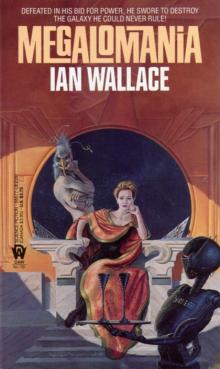 Megalomania
Megalomania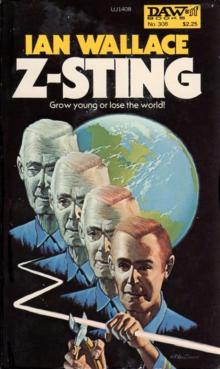 Z-Sting (2475 CE)
Z-Sting (2475 CE) The World Asunder
The World Asunder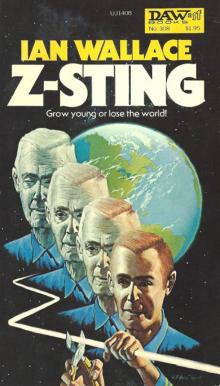 Z-Sting
Z-Sting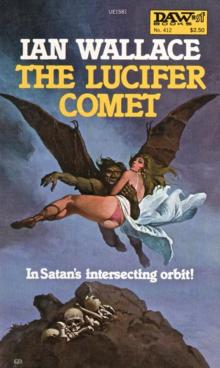 Lucifer Comet (2464 CE)
Lucifer Comet (2464 CE)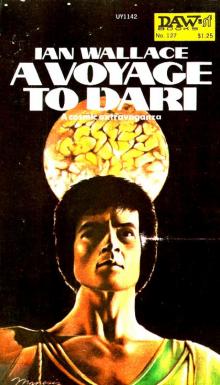 A Voyage To Dari
A Voyage To Dari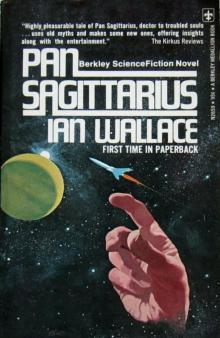 Pan Sagittarius (2509 CE)
Pan Sagittarius (2509 CE)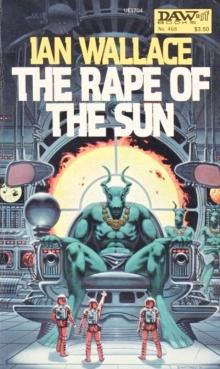 The Rape of The Sun
The Rape of The Sun